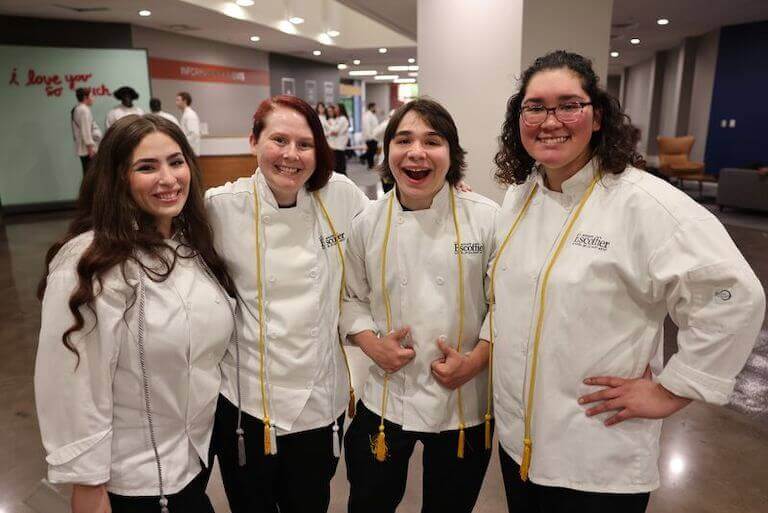Starting at a culinary school can be an exciting step on your path to becoming a skilled chef or a hospitality expert. It’s a world where you can explore much more than just cooking techniques and recipes. As you begin this journey, it can be normal to find yourself in unfamiliar territory, absorbing new skills that can sometimes feel overwhelming.
This is where learning how to manage stress can become crucial. It’s not just about cooking; it’s about maintaining your well-being in a fast-paced, demanding environment.
To arm you with some of the most helpful resources and stress management benefits, we sat down with Wonda Grobbelaar, a professional chef who’s an expert in soft skills development, as well as a Ph.D. candidate researching how to navigate stress in the kitchen. Together, we dove into the techniques that not only help prevent burnout but can also enhance your culinary prowess and well-being.
Benefits of Stress Management for Culinary Students
According to a recent study, acquiring new skills through training is an instrumental factor that can influence an individuals’ psychological health and overall well-being.
To begin, let’s explore some additional perks that may come with practicing the art of stress management.

Actively practicing stress management skills as a culinary student can help promote academic success!
1. Boost Overall Mental Health and Well-Being
According to insights from a Frontiers study, adopting stress management techniques, such as spending twenty minutes in nature, can not only lift your spirits but is also linked to lower stress hormone levels. Now, for culinary students, staying on top of your mental health game during school can be absolutely crucial. It can be a critical ingredient for crafting a clear vision of your future while navigating assignments and social interactions with peers and faculty!
Stress Management Activities for Culinary Students
- Zen Out with Meditation Magic: Dive into the serenity pool by practicing deep meditation or the art of calming breathing techniques.
- Sweat It Out: Break free from the study grind and groove into 30 minutes of daily exercise.
- Fuel Your Brain with Good Nutrition: Spice up your routine by adopting consistent, healthy eating habits. Your brain will thank you later.
- Nature’s Therapy – Hike Without Distractions: Whether you hike up a trail or simply bask in the great outdoors, nature is your stress-busting playground
- Practice Altruism in Your Community: Find your happy place by getting involved in the community or volunteering. It’s not just about giving back; it’s a stress-relieving, feel-good journey.
- Therapeutic Talks with a Pro: Set aside time to chat with a mental health pro. Talking it out can be the key to unlocking a stress-free state of mind.
- Cooking with Consciousness: Step into the mindful kitchen, where every ingredient and every moment counts. It’s not just cooking; it’s a cathartic culinary experience.
- Creative Escapes – Paint, Write, Repeat: Unleash your inner artist or poet to escape the stress zone. Engage in expressive outlets like writing poetry or painting, where stress takes a backseat to imagination.
2. Enhanced Creativity and Performance
For just a moment, imagine you’re a Baking & Pastry student at Escoffier. One day, you might be creating elaborate, one-of-a-kind chocolate decorations, and the next day may entail shaping various sweet doughs. But no matter what program you’re enrolled in, as a culinarian, you are inherently an artist. And artists always need to muster up a great deal of creative energy and innovation on a frequent basis!
But, and here’s the BIG but…as a culinary student, if any type of stress dominates your day-to-day routine, creativity can quickly become inhibited. To paint this picture more vividly, on a bodily level, cortisol levels may rise when stressed, causing a cascade of physiological, psychological, and neurological changes. Our bodies may experience an increase in temperature, leading to perspiration, an elevated heart rate, and a feeling of unease or heightened alertness.
This is exactly why it can be challenging to be productive when required to perform. However, stress management skills can calm the nervous system, propel us out of that pesky fight or flight mode, and help us get into the creative flow again!
3. Cultivate More Meaningful Relationships
When under stress, this can inevitably impact interpersonal relationships with the ones who may matter the most. Our brains might be clouded with jumbled thoughts and to-do lists, and at the end of the day, we might not have the mental energy to maintain important connections. But when stress begins to jeopardize relationships, we can quickly lose our support network, which is absolutely essential while in culinary school.

Prioritizing your mental health can open the gateways to stronger relationships with peers!
As a culinary student, networking with peers, Chef Instructors, and other faculty members, can help you build a web of lifelong relationships in the culinary world. Cultivating strong ties can, over time, construct an unbreakable bond and sense of belonging, which may also bolster academic success. To bring this back full circle, stress management may give culinary students the emotional bandwidth to maintain these critical relationships throughout their education journey!
4. Facilitate Longer-Term Career Satisfaction
We hinted at the fact that practicing stress management skills while in culinary school can transfer to the professional world, like a fast-paced kitchen, bakery, or hotel, which can foster long-term career satisfaction.
Think about it, if you’re actively practicing meditation or breathing techniques while in school, you might be already armed with the tool kit you need to conquer any hurdles that come your way, such as an upset customer or new recipe that didn’t go according to plan. You can also be an active player in shaping a “future” workplace culture that promotes mental health and well-being. Aside from this, exploring stress management techniques may also prevent burnout, which can help you lead a thriving, long-term career!
Watching for Burnout Signs: Expert Insight with Wonda Grobbelaar
Unsure if you’re experiencing burnout? According to Grobbelaar, here are some signs to look out for:
- The perception of work as a stressor
- Persistent fatigue
- Diminishing energy levels
- Onset of depression and anxiety
- Withdrawal from social interactions
- Lack of enthusiasm for previously enjoyable activities
Stress Management: An Essential Culinary School Ingredient
Of course, it’s critical to shoot for the stars while you’re in culinary school and unlock your greatest potential. By actively practicing stress management skills along your journey, you can begin to tackle your future goals with a sense of assurance, clarity, and ease!
Student services at Escoffier have additional resources that may help you manage the stress culinary school can bring. So, if you are ready to take the next step in your educational journey or searching for career guidance, don’t hesitate to connect with Career Services.
READY TO READ MORE ARTICLES SIMILAR TO THIS ONE? TRY THESE NEXT:
- How Chefs Can Manage Stress In a Professional Kitchen
- 5 Tips All Chefs Should Follow to Avoid Burnout
- How Full-Time, Working Adults Can Succeed in Online Culinary School
*Information may not reflect every student’s experience. Results and outcomes may be based on several factors, such as geographical region or previous experience.




